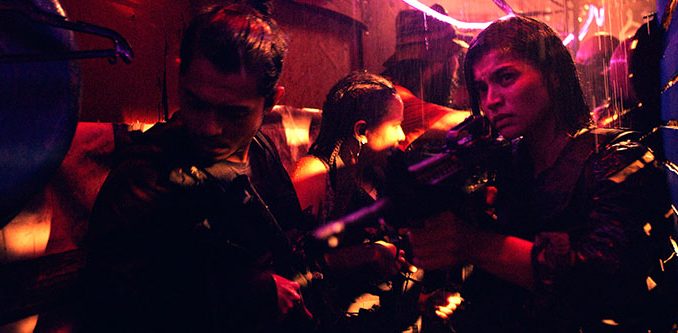
Philippine cinema has been in the spotlight for some time already, yet it keeps surprising me with its potential. On this 7th day of the Sitges Film Festival, we had the chance to descend to the capital suburbs inferno by the hand of BuyBust (2018) and Bamboo Dogs (2018).
In BuyBust (2018), by Erik Matti, a policewoman that just lost her team on a failed mission becomes the new goal of infiltrating one of Manila’s most dangerous neighborhoods. She and her new team will try to hunt down the dealers’ gang, just to find themselves completely trapped when their cover blows up, in a maze of narrow and dangerous streets that may become their grave. With a female protagonist, the two hours film deploys an arsenal of blood, shooting, body combat and basically banging with whatever handy instrument they find, under the tropical deluge, all along the night where they try to save their lives by finding the way out of hell. Even if the realism of the action might not be the best one (some references like The Raid (2011) or Dredd (2012) are still on top of those aspects) the way in which Matti plunges us into that incredibly colorful labyrinth of chaos, made of the homes of many people from the suburbs that find themselves also kind of trapped under the gang’s ruling and power abuse, is still absorbing, mesmerizing at times. The set is in this case like a huge animal that fights back, trying to expel the order intruders but just turning itself into a bloody muddy full of corpses mess. The two hours of film accelerate towards the end, to finally face us with the biggest of problems: corruption, or the impossibility of order to win over chaos.
On the other hand, Bamboo Dogs (2018) does the same in a very different way: the detention of a group of delinquents and their ride through the night, around the city, without being able to reach the destination point, is like a distressing journey descending to Manila’s hell. Based on true events that took place in 1995, the director chooses this time a very peaced scenario, based on dialogues in the car for most of the film, and with an equally dark image that keeps them trapped in the city’s night without chance of escaping. Khavn, its Philippian director (and an institution in his country, with more than 50 features, 120 shorts and experimental videos, 6 books and 23 records to count on his fruitful career), summarized it as “a boring movie with a musical scene at the end”. Definitely not made for all sorts of audiences, still an interesting new proposal from the director of Alipato: The Very Brief Life of an Ember (2016), which we also had the chance to watch in Sitges 2016.
To complete the day’s chronicle, a much awaited film had its world premiere at the Festival today: Fonotune: An Electric Fairytale (2018) by director FINT, had its screening in the New Visions section of the festival. A fictional debut in his career, the director (with strong influences of his graphic design and comic background) offered a very special vision indeed on whatever an electric fairytale may sound like. With a strong visual richness, the experiment may either turn out as a reference artwork, as well as quickly fall into oblivion, so thin is sometimes the line between failure and greatness. The appearance of Guitar Wolf Seiji (who came along with the director, producers, and a huge representation of the movie crew) was part of the highlights of the day, and somehow adds a chance for it to at least be considered in the new experimental grounds where sound and images converge.




